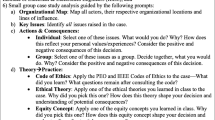Abstract
At Shantou University (STU) in 2008, a stand-alone engineering ethics course was first included within a Conceive–Design–Implement–Operate (CDIO) curriculum to address the scarcity of engineering ethics education in China. The philosophy of the course design is to help students to develop an in-depth understanding of social sustainability and to fulfill the obligations of engineers in the twenty-first century within the context of CDIO engineering practices. To guarantee the necessary cooperation of the relevant parties, we have taken advantage of the top-down support from the STU administration. Three themes corresponding to contemporary issues in China were chosen as the course content: engineers’ social obligations, intellectual property and engineering safety criteria. Some popular pedagogies are used for ethics instruction such as case studies and group discussions through role-playing. To impart the diverse expertise of the practical professional practice, team teaching is adopted by interdisciplinary instructors with strong qualifications and industrial backgrounds. Although the assessment of the effectiveness of the course in enhancing students’ sense of ethics is limited to assignment reports and class discussions, our endeavor is seen as positive and will continue to sustain the CDIO reform initiatives of STU.
Similar content being viewed by others
Notes
For every CDIO project team, a teacher/faculty member is assigned responsibility for the guidance of their engineering practices, which is mostly conducted in extra-curricular periods. In general, every teacher has to guide three or four teams because of limited staffing. As expected, the teacher helps students to identify both ethical and technical issues to give students the opportunity to practice ethical decision-making. To some extent, this approach can be regarded as pervasive ethics education.
References
Accreditation Board for Engineering and Technology. (2011). Accessed September 2011, http://www.abet.org.
Berggren, K. F., Brodeur, D., Crawley, E. F., Ingemarsson, I., Litant, W. T. G., Malmqvist, J., et al. (2003). CDIO: An international initiative for reforming engineering education. World Transaction on Engineering and Technology Education, 2(1), 49–52.
Billington, D. P. (2006). Teaching ethics in engineering education through historical analysis. Science and Engineering Ethics, 12(1), 205–222.
Charles, E. (2006). Engineering ethics concepts & cases (Translated in Chinese). Third version. Beijing: Beijing Institution of Science and Technology Press.
Crawley, E. F., Malmqvist, J., Lucas, W. A., & Brodeur, D. R. (2011). The CDIO Syllabus v2.0 An updated statement of goals for engineering education. In Proceedings of the 7th international CDIO conference, Copenhagen, June 2011 (pp. 1–42).
Davis, M. (1999). Teaching ethics across the engineering curriculum. In: International conference on ethics in engineering and computer science, Online Ethics Center for Engineering. www.onlineethics.org/Education/instructessays/curriculum.aspx.
Gu, P. H., Lu, X. H., Xiong, G. J., Li, S. P., & Shen, M. F. (2006). Development of design directed engineering curriculum based on CDIO Framework. World Transaction on Engineering and Technology Education, 5(2), 267–270.
Hamad, J. A., Hasanain, M., Abdulwahed, M., & Al-Ammari, R. (2013). Ethics in engineering education: A literature review. In Frontiers in education conference 2013 IEEE (pp. 1554–1560).
Herkert, J. R. (2000). Engineering ethics education in the USA: Content, pedagogy and curriculum. European Journal of Engineering Education, 25(4), 303–313.
Manion, M. (2002). Ethics, engineering, and sustainable development. IEEE Technology and Society Magazine, 21(3), 9–48.
Michelfelder, D., & Jones, S. A. (2013). Sustaining codes of ethics for the twenty-first century. Science and Engineering Ethics, 19(1), 237–258.
Ozaktas, H. M. (2013). Teaching science technology and society to engineering students: A sixteen year journey. Science and Engineering Ethics, 19(4), 1439–1450.
The CDIO ™ Standards. (2013). Accessed June 2013, http://www.cdio.org.
Zandvoort, H., Borsen, T., Deneke, M., & Bird, S. J. (2013). Editors overview perspectives on teaching social responsibility to students in science and engineering. Science and Engineering Ethics, 19(4), 1413–1438.
Zhou, B. S. (2010, August 26). Reestablishment of the value education of Chinese University (in Chinese). Southern Weekend Newspaper. http://www.infzm.com/content/49415
Acknowledgments
Partial financial support was provided by a grant from the Finance Bureau of GD Province for Teaching Reform, “Setting Up a Teaching Team for CDIO Engineering Education Reform of the Mechatronic Discipline.” The authors are very thankful for the helpful comments of the anonymous reviewers and journal editors. Throughout the organization of the course, the STU executive president, Prof. Gu, provided important and valuable suggestions that the authors incorporated into the manuscript, and ensured that significant support was received from the STU administration, which the authors would like to acknowledge gratefully. Finally, the authors are also very grateful for the immense help from the additional editors and colleagues, Prof. Chengjin Zhang, Prof. Dongxiao Qin and Prof. Yongping Zhong.
Author information
Authors and Affiliations
Corresponding author
Rights and permissions
About this article
Cite this article
Fan, Y., Zhang, X. & Xie, X. Design and Development of a Course in Professionalism and Ethics for CDIO Curriculum in China. Sci Eng Ethics 21, 1381–1389 (2015). https://doi.org/10.1007/s11948-014-9592-2
Received:
Accepted:
Published:
Issue Date:
DOI: https://doi.org/10.1007/s11948-014-9592-2




